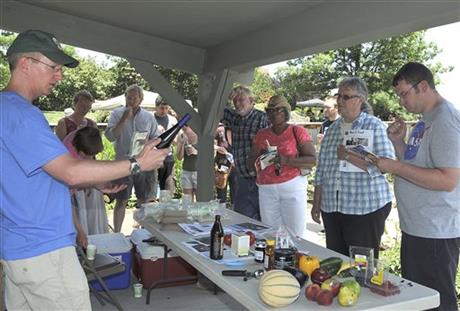
By NEDRA PICKLER
In this June 23, 2012 photo, Michigan State University professor of entomology Rufus Isaacs, left, talks to visitors at Bee-Palooza event in East Lansing, Mich. When President Barack Obama comes to East Lansing on Friday to sign the Farm Bill it will put attention on how research schools such as Michigan State University will be one of the big beneficiaries of the nearly $100 billion-a-year measure — even if the millions it represents is comparatively small. And scientists are breathing a sigh of relief that funding will continue flowing, along with money for new efforts, after years of political wrangling. (AP Photo/Lansing State Journal, Robert Killips)
Debbie Stabenow
FILE – In this Feb 4, 2014 file photo, Senate Agriculture Committee Chair Sen. Debbie Stabenow, D-Mich., is seen during a news conference on Capitol Hill in Washington, Tuesday, Feb. 4, 2014, after Congress gave its final approval to a sweeping five-year farm bill. When President Barack Obama comes to East Lansing on Friday to sign the Farm Bill, it will put attention on how research schools such as Michigan State University will be one of the big beneficiaries of the nearly $100 billion-a-year measure — even if the millions it represents is comparatively small. And scientists are breathing a sigh of relief that funding will continue flowing, along with money for new efforts, after years of political wrangling. (AP Photo/J. Scott Applewhite)
Prev 1 of 2 Next
WASHINGTON (AP) — President Barack Obama is carrying out a presidential duty that he hasn’t had a lot of opportunity to perform recently: signing into law a major piece of bipartisan legislation.
Obama planned to sign a far-reaching farm bill Friday at Michigan State University, choosing heartland America for a rare celebration of Washington political compromise. The bill expands federal crop insurance and ends direct government payments that go to farmers whether they produce anything or not. But the bulk of its $100 billion per year cost is for the food stamp program that aids 1 in 7 Americans.
The White House says Obama plans to squeeze into his three-hour visit to Michigan a lunch with Detroit Mayor Mike Duggan, who took office last month. The city is going through the largest municipal bankruptcy in U.S. history. They will be joined by Obama’s point person on Detroit, Don Graves, senior adviser at the President’s National Economic Council.
Obama has said the farm bill isn’t perfect, but will reduce the deficit “without gutting the vital assistance programs millions of hardworking Americans count on to help put food on the table for their families.”
The five-year bill cuts food stamps by $800 million a year, or around 1 percent, one-fifth of the cut approved last fall by the Republican-led House. Conservatives remain unhappy with the bill and its generous new subsidies for farmers in every region of the country, including Southern peanut growers, Midwest corn farmers and the Northeast maple syrup industry.
A partisan dispute over food stamp spending held up the legislation for two years, and last fall lawmakers were warning of an impending spike in milk prices without a deal on the bill, which contains federal dairy supports. The prospect of compromise seemed bleak at the time, when lawmakers couldn’t even pass a budget to keep the government running.
The first thing Obama did after a deal finally was reached to end the partial government shutdown was to call on Congress to pass the farm bill, along with a budget and an immigration overhaul. In four months he’s gone 2 for 3, with chances for achieving immigration legislation appearing increasingly iffy.
Obama promised in his State of the Union address last week to make 2014 a year of action, using his presidential powers besides pushing a Congress that usually is reluctant to go along with his ideas. In that spirit, he’s coupling the signing of the farm bill with a new administration initiative to boost exports called “Made in Rural America.”
According to a draft of the initiative, Obama plans to direct his administration to work on connecting rural businesses with federal resources that can help sell their products and services abroad. The steps he’s directing agencies to take include hosting five regional forums for rural businesses, training Agriculture Department staff in all 50 states to advise on export opportunities, and putting on a national conference to highlight successful projects.
The program’s creation comes as U.S. farmers are sending record exports overseas — more than $140 billion in the past year, driven in large part by increasing demand from China. But administration officials say additional opportunities exist for farmers and other rural business owners.
Obama’s trip Friday is a reward for Sen. Debbie Stabenow, D-Mich., who as chairwoman of the Senate Agriculture Committee helped broker a hard-fought farm bill compromise after years of setbacks. Michigan State, a leading agricultural research school, is Stabenow’s alma mater.
Before the bill signing at the university’s equine performance center, Obama plans to visit Michigan Biotechnology Institute for a look at research to benefit rural communities.
___



